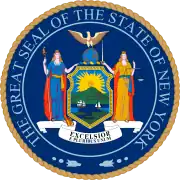1861 New York state election
The 1861 New York state election was held on November 5, 1861, to elect the Secretary of State, the State Comptroller, the New York State Attorney General, the State Treasurer, the State Engineer, a Judge of the New York Court of Appeals, two Canal Commissioners and an Inspector of State Prisons, as well as all members of the New York State Assembly and the New York State Senate.
| Elections in New York State |
|---|
 |
History
The "Independent People's" state convention met on September 10 at Syracuse, New York with the intention to nominate a ticket which would be endorsed by the Republican state convention which was due to meet at the same city on the following day. The convention was dominated by the old Hunkers/Hard faction of the Democratic Party (which had supported John C. Breckinridge for the Presidency the year before, and had been reduced to a small minority at the 1860 New York state election) and the Greeley Republicans.[1]
The Republican state convention met on September 11 at Syracuse, New York and endorsed the Independent People's ticket with the exception of Frederick A. Tallmadge. The Republicans preferred the incumbent Canal Commissioner Benjamin F. Bruce to be re-nominated.
Results
The whole jointly nominated part of the "Union" ticket was elected, only the Democratic candidate for short-term Canal Commissioner William W. Wright was elected due to the split of the "Union" ticket.
The incumbents Floyd-Jones, Richmond, Comstock and Bruce were defeated.
22 Republicans and 10 Democrats were elected[2] to a two-year term (1862–63) in the New York State Senate.
The New York State Assembly of 1862 was almost evenly divided between Republicans and Democrats, most of whom had been elected on the "Union" ticket. There was a small majority of Republicans.
| Office | Independent People's ticket[3] | Republican ticket[4] | Democratic ticket | |||
|---|---|---|---|---|---|---|
| Secretary of State | Horatio Ballard | 297,428[5] | Horatio Ballard | David R. Floyd-Jones | 189,716 | |
| Comptroller | Lucius Robinson | 296,855 | Lucius Robinson | George G. Scott | 188,654 | |
| Attorney General | Daniel S. Dickinson | 295,609 | Daniel S. Dickinson | Marshall B. Champlain | 188,361 | |
| Treasurer | William B. Lewis | 296,709 | William B. Lewis | William Williams | 188,774 | |
| State Engineer | William B. Taylor | 294,422 | William B. Taylor | Van Rensselaer Richmond | 188,507 | |
| Judge of the Court of Appeals | William B. Wright | 276,901 | William B. Wright | George F. Comstock | 198,746 | |
| Canal Commissioner (full term) | Franklin A. Alberger | 295,960 | Franklin A. Alberger | Jarvis Lord | 181,283 | |
| Canal Commissioner (short term)[6] |
Frederick A. Tallmadge | 106,721 | Benjamin F. Bruce | 179,691 | William W. Wright | 198,385 |
| Inspector of State Prisons | Abraham B. Tappen | 297,126 | Abraham B. Tappen | William C. Rhodes | 189,260 | |
Sources
- Result in The Tribune Almanac 1862
- The Union ticket: in Harper's Weekly, September 28, 1861, pg. 611
- The tickets: in NYT on November 5, 1861 (giving "Low" instead of Lord)
Notes
- STATE POLITICS - INDEPENDENT PEOPLE'S CONVENTION in NYT on September 10, 1861
- Many were elected on the "Union" ticket.
- later known as the War Democrats
- The Independent People's ticket was almost completely endorsed by the Republicans, which then became known as the "Union" ticket, although the tickets had different names for the short-term Canal Commissioner.
- total votes on "Union" ticket for Ballard, Robinson, Dickinson, Lewis, Taylor, William B. Wright, Alberger and Tappen
- To fill the vacancy caused by the death of Samuel H. Barnes, a commissioner was elected to a two-year term.